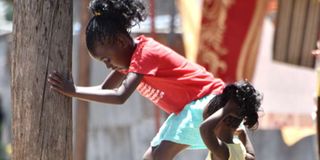Breaking News: Ruto orders postponement of school reopening
Covid-19 in children: Researchers unearth crucial details

Children play outside their house at Tudor in Mombasa County.
What you need to know:
- Researchers investigated the response of antibodies in children when the coronavirus attacks
- Experts says the difference in severity of the disease in adults and children could be linked to the cytokine storm
- A cytokine storm causes inflammation in many different organs of the body
Children are less likely to spread the virus because their bodies' immune systems are able to clear the infection much faster than adults, a study shows.
The study, published in the journal Nature Immunology by scientists from Columbia University in New York, showed that their bodies react to the disease in a subtle way than adults and produce fewer antibodies to fight the disease.
Antibodies are specialised cells in the immune systems of our bodies, produced when there is a foreign invasion in the body, like a virus. They act like soldiers who come out when there is an enemy attack.
They are not the only form of immunological response. “There are other protective responses like the cytotoxic T-Cells and as you grow older, your immune system experiences different types of infections and those experiences prime your immune response to respond in a certain way, and its exaggeration may lead to a cytokine storm,” says Francis Ndung’u, a microbiologist.
Cause inflammation
He explains this phenomenon. “Children haven’t had a lot of immunological responses that would kill them like adults, whom a cytokine storm (exaggerated inflammatory responses) makes very sick, and it is not common in children,” he says.
Dr Anthony Etyang, who specialises in adult medicine and epidemiology, also says the difference in severity of the disease in adults and children could be linked to the cytokine storm. “Children don’t seem to generate a cytokine storm as big as adults,” he says.
“It causes inflammation in many different organs of the body: lungs, kidneys, the heart. It is a disorganised form of inflammation and that is why it is called a storm. It causes the organs to fail and in the worst case scenario, it leads to death,” adds Dr Etyang.
This study comes after Kenya reported 145 learners have been infected with the coronavirus since schools opened on October 12. Bahati Girls in Nakuru County, which has recorded the highest infection so far, had about 68 cases.
In the study, the researchers investigated the response of antibodies in children when the coronavirus attacks. “The reduced functional antibody response in children compared to adults could also be due to efficacious immune-mediated viral clearance resulting in fewer respiratory symptoms and severe illness,” the study says.
“Defining the nature of the antibody response to Sars-Cov-2 infection as a function of age and clinical syndrome can provide essential insights for improved screening and targeted protection for the global population that continues to suffer from this relentless pandemic,” the study said.
Essential insights
Dr Patrick Amoth, the Health ministry acting director-general, said having an underlying condition is the main cause of death of Covid-19 patients in Kenya, children included.
“While the virus can affect anyone, those with other health problems are at a higher risk because their immunity is already tackling another long-term illness. This affects your body’s ability to respond quickly to exterior factors, which puts these individuals at a greater risk of contracting further diseases if exposed,” he said.
Generally, children account for a minimal number of those severely affected by Covid-19, albeit infrequently. “Children can also have severe Covid-19, but it is a rare occurrence and it is not known why those children have severe cases. For instance, in America and Europe, something similar to Kawasaki Disease,” says Ndung’u.


